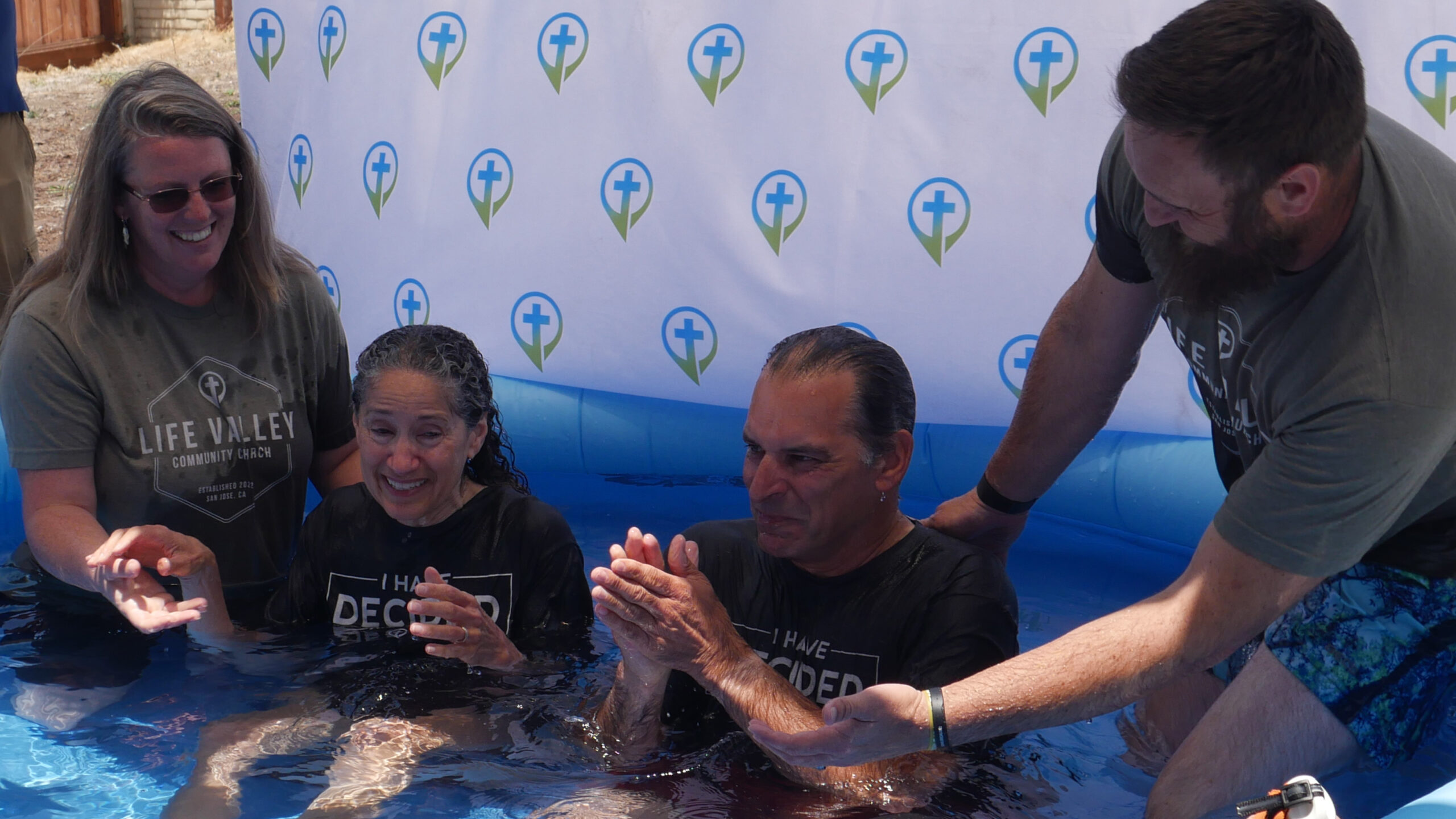Pentecost Sunday is the church began with the gift of the Holy Spirit, in which 3,000 people were saved, baptized, and added to the church in a single day (Acts 2). This Christian holiday is exactly 7 weeks after Easter, and a day Christians of any denomination can and should consider commemorating. The best way to do so, in my opinion, is by baptizing new followers of Christ, just as the early church did on Pentecost.
This Pentecost (June 8, 2025), our church baptized 18 people on Pentecost Sunday. Of those 18, 12 were people who had recently expressed they had received Christ and were ready to declare their faith publicly through believer’s baptism. Another two people were individuals who had recently trusted in Christ or were coming back to their faith after wandering, but we did not know for sure if they were ready to get baptized. And then there were four people who decided that day to receive Christ and/or take their next step through baptism. I have generally called this “spontaneous baptisms” as they were not planned in advance, but I’ve also heard this called “open baptisms” as the invitation to get baptized that day is “open” to whoever is ready to declare Christ as Savior and be baptized.
We did this baptism service in cooperation with thousands of other churches across the country in a coordinated effort we called Baptize America. As a result, we collectively led 27,858 people into believer’s baptism on Pentecost weekend – a historic event, and the largest coordinated baptism service in the history of the church, best as we can tell. Next Pentecost Sunday (May 24, 2026), we are collectively working the same event, but globally, calling it Baptize All Nations. I have been very committed to urging my fellow American pastors – and international pastors and missionaries – to participate with us in this coordinated effort. One of the hang-ups many pastors have is that they are uncomfortable with the idea of spontaneous baptisms, so if you’ll indulge me, I’d like to make a case for doing spontaneous baptisms, at least on occasion.
Why your church should consider doing spontaneous baptisms:
- It’s the only kind of baptism we see in the New Testament. Read Acts carefully, focusing on the mode of baptism, and you’ll quickly discover that day-of baptisms were the only baptisms found in the early church. Not only on the day of Pentecost (Acts 2:41), but also with the Ethiopian eunuch (Acts 8:36-38), Cornelius (Acts 10:44-48), and the Philippian jailor (Acts 16:30-34).
- We only ever know so much about a person’s heart anyway. One of the biggest reasons for delaying baptism is that we want to know that the convert to Christianity is truly sincere. We think that time and perhaps proper vetting will tell us the truth of their devotion to Christ. What I find is that often this only serves to frustrate the new believer rather than leading them toward obedience. And none of us truly knows the heart of a person anyway. Yes, we should discern as best as we can, seek guidance from the Lord, and be reasonably diligent in our assessment of their faith in Christ. But in the end, their salvation is between them and God. That is why we all must “work out [our] own salvation with fear and trembling.” (Philippians 2:12).
- It gets back to the Biblical expression of our salvation. One of my frustrations with the “wait and see first” model of baptism, is that it creates too much division between saving faith and our first works in Christ. Often driven by an effort to view baptism as a “work” protestants, evangelicals, and fundamentalists have all been swift to create space between salvation and baptism. “After all,” we’ve argued, “baptism doesn’t save us anyway.” And so in place of baptism, we’ve had people pray a prayer out loud, check a box on a card, raise their hand, stand to their feet, come forward to the altar, etc. – none of which we will find in the Bible. What we will find as the mechanism for people choosing Jesus as their Lord and Savior is being baptized. I could write a whole other blog post about this, but in short, no baptism does not save you, Jesus does, and “by grace you have been saved through faith…” (Ephesians 2:8-10). And yet, if you have truly trusted in Jesus and placed your faith in Him as your Lord and Savior, I am convinced by God’s Word that you will get baptized, provided that you are not somehow physically incapable of doing so such as the thief on the cross.
If I have sufficiently persuaded you to be open to the idea of spontaneous baptisms, let me share a little about how we did this successfully, and you can also…
How do you have a successful spontaneous baptism Sunday…
- Plan ahead. Just because there will be people who did not plan on getting baptized until that day, doesn’t mean you didn’t plan for them! We have a darker colored baptism shirt that our people get to keep when they get baptized, that has our church logo and “I have decided” printed on it, in honor of the old hymn, “I Have Decided to Follow Jesus.” We have every size possible of the shirts, and we also have shorts and undergarments that we buy cheap and in bulk – all of which they keep! We also have hairdryers and brushes for the women, plenty of towels, and volunteer photographers to capture the event for their loved ones who might now be there.
- Preach the Gospel! We never just “let” people get baptized! We make sure to give a clear, straightforward Gospel presentation with an opportunity to respond. Usually (such as for Pentecost Sunday) we commit the entire service to celebrating past baptisms, and teaching on what baptism is according to the Bible. This makes sure we do our part to make people understand as clearly, yet as simply as possible, the deep importance of knowing Jesus and following in baptism. This past year I preached from Romans 6.
- Have counselors available. Everyone gets counseled beforehand! This year, we had a list of everyone we knew was planning to get baptized, and we had previously counseled them about the Gospel, knowing Jesus, and the importance of being baptized. So when they stood to get baptized, they just had to change and be ready. But for those who were not previously planned, but were more “spontaneous” in the moment to get baptized, we have dedicated leaders, pastors, elders, etc. who were prepared to go over the Gospel and baptism with them. These conversations usually only take 5 minutes, since we just gave an entire sermon on the subject.
- Be appropriately restrictive. We will not just baptize anyone who comes forward. One of the things we say before we give people the opportunity to respond is that – while we do baptize children 6 years old or older – we never baptize kids under 16 spontaneously. Out of the 18 kids we baptized, four of them were children between ages 6-10. But all of these kids had multiple conversations, often over the course of a few months or even over a year. We want to be sure that a child understands the Gospel at an appropriate level and remembers the decision to follow Jesus into baptism. We also occasionally have to tell an adult, “No, not today.” They could be struggling with the Gospel, wanting to get baptized for a bad reason, etc. So we politely defer their baptism to a later day after we can talk more thoroughly through whatever issue they may be hung up on.
It is a thrilling experience to give people the opportunity to say “yes” to Jesus, and watch them immediately go forward in baptism in the same day and moment. If you are a pastor/church leader who would like help arranging a spontaneous baptism service at your church, or you want to know more about participating in a global move of baptisms next Pentecost Sunday, you can email me at pastor@johnmarkum.org.
Also, if you would like to know more about getting baptized at Life Valley Church, click here! We plan on having our next baptism service Sunday, September 14.
Blessings,
Pastor John




